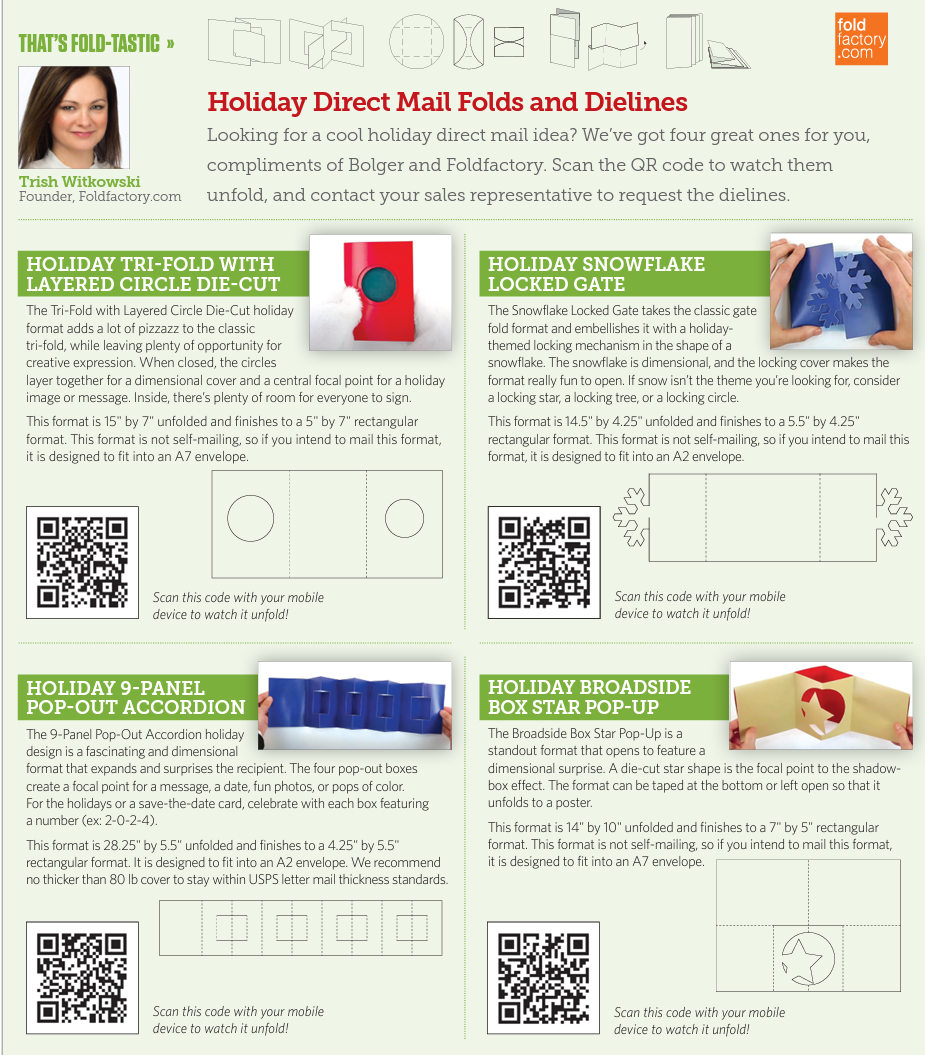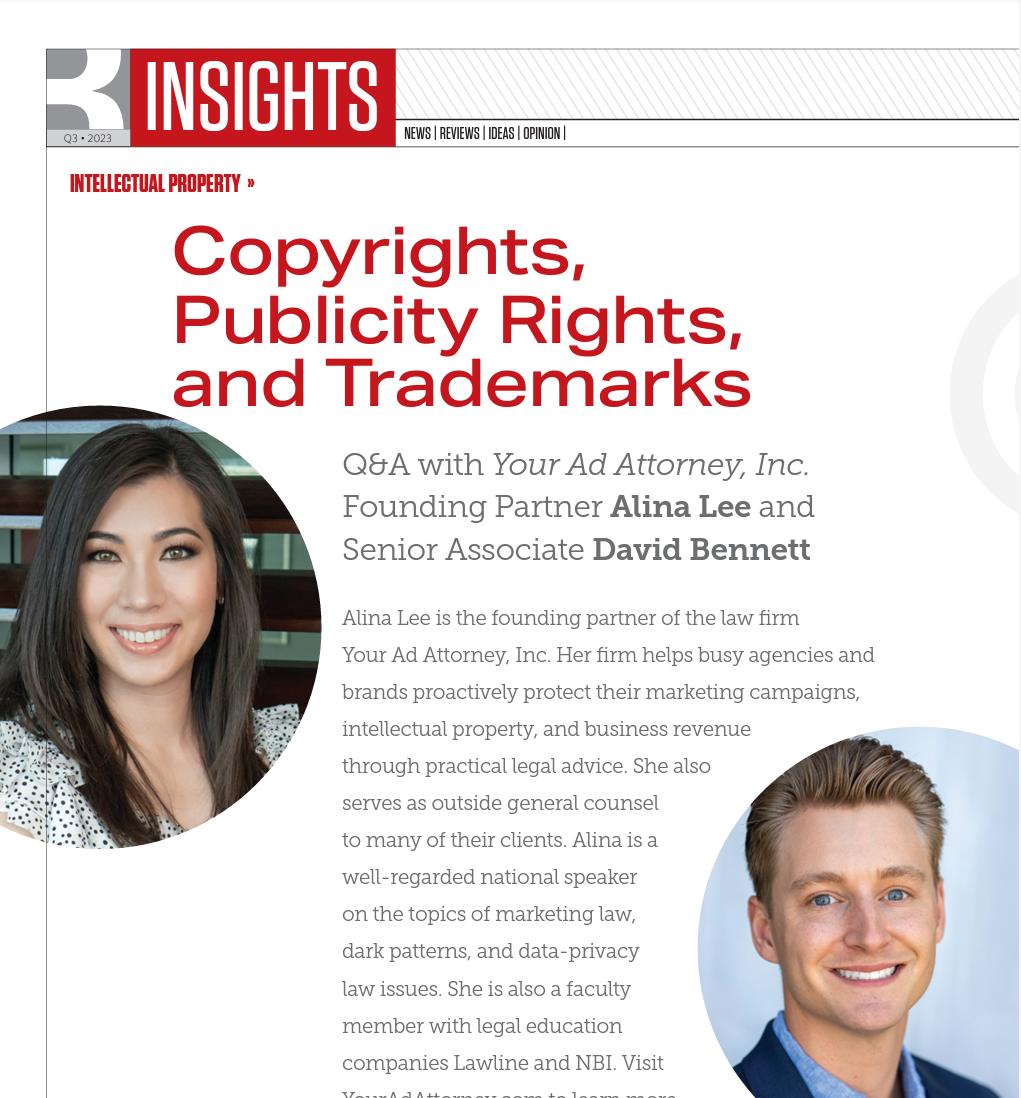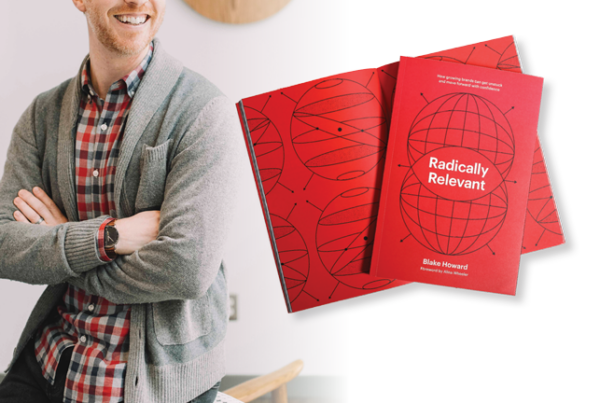Q&A with Your Ad Attorney, Inc. Founding Partner Alina Lee and Senior Associate David Bennett
Alina Lee is the founding partner of the law firm Your Ad Attorney, Inc. Her firm helps busy agencies and brands proactively protect their marketing campaigns, intellectual property, and business revenue through practical legal advice. She also serves as outside general counsel to many of their clients. Alina is a well-regarded national speaker on the topics of marketing law, dark patterns, and data-privacy law issues. She is also a faculty member with legal education companies Lawline and NBI. Visit YourAdAttorney.com to learn more.
Q: Can you explain the different types of intellectual property (trademarks, copyright, etc.) that a brand or marketing person should be familiar with?
Marketing professionals should be familiar with copyrights, publicity rights, and trademarks, because all of these elements are commonplace in marketing campaigns.
Copyrights
Copyrights are legal protections that give creators special rights over their original works. These works can be things like books, music, movies, art, graphics, fonts, photographs, articles, or software. Copyrights allow creators to decide who can make copies of, distribute, display, or perform their works. Copyrights help creators protect their work, encourage people to be creative, and help them control how their work is used. The most important lesson for brands and marketing teams is “don’t use another’s creative works without permission from the owner.” Also, if you have independent contractors helping on the creative side of a marketing campaign, make sure that you have a contract with each of those contractors that clearly states that you either own the work they create for you or have sufficient license rights to use their work as intended. For example, usually, copywriters and graphic designers are fine with granting ownership of their work to brands or agencies, while photographers, videographers, font foundries, and musicians tend to prefer licensing their work for specific purposes.
Creators can register their copyrighted works with the US Copyright Office. Registration provides many benefits, such as providing creators with the ability to sue for copyright infringement. To learn more about copyrights, I recommend going to Copyright.gov, which has many free resources about copyrights and how to register your copyright.
Publicity Rights
Publicity rights are the legal rights of a natural human to control the use of their identity and prevent others from using their identity for commercial purposes without their permission. Protected aspects of someone’s identity include their name (including nicknames or stage names), likeness (how they look), voice, and sometimes signature. Violating celebrities’ and other well-known people’s publicity rights is a high risk, since they (and their business partners and sponsors) can usually afford to bring lawsuits. Therefore, it’s a bad idea to use someone’s picture or name in a marketing campaign without their written permission, usually in the form of a signed publicity release or other licensing agreement.
Trademarks
Trademarks are most known as company logos, brand names, and taglines, although other brand markers, such as music jingles and colors, can be trademarked if they’re sufficiently distinct and well-known. For example, UPS has trademarked their company name, logo, tagline, and special brown color. McDonald’s has done the same, plus they have trademarked their jingle. Ferrari has also successfully argued that the shape and color of their cars is trademarked because they are sufficiently visually distinct from all other cars. Trademarks distinguish one brand from another and help build customer recognition and trust. Unlike other types of intellectual property, trademarks are only protected while they are actively in use and only so long as owners take sufficient steps to prevent others from using their trademarks. When a business stops using a trademark as part of their brand for an extended period, they lose their trademark protections. Trademarks play a critical role in brand protection by providing registered trademark owners with legal rights to stop competitors from using confusingly similar brand names, logos, and taglines.
Unless you have proactively registered your trademark with a state or the federal government or you have been using your mark for a significant period of time, you have little to no legal protection over your trademark. Registering your trademark with the US Patent and Trademark Office provides many benefits, including protection across the USA (rather than only where you do business) and across a broader class of products or services (rather than only the specific products or services you offer).
The key is that marketing professionals should not use any trademarks in marketing campaigns unless their client owns the trademark or they have clear licensing rights that allow them to use the trademark in the campaign, which often must comply with the company’s brand guidelines and be subject to prior legal review and approval by the trademark owner before it can be used. Failing to obtain a license or other prior written approval before using someone’s trademark can easily lead to lawsuits and harm business relationships between the brands at issue.
Check out USPTO.gov to learn more about trademarks.
Q: Can you give our readers examples of what should be trademarked by a company or a brand?
At a minimum, companies should consider protecting their company name, brand names, product or service names, logos, and taglines. Here are some well-known examples of different trademarks:
- Brand Names: Coca-Cola, Nike, Apple
- Logos and Symbols: The Nike Swoosh, the Apple logo
• Slogans and Taglines: “Just Do It” for Nike, “I’m Lovin’ It” for McDonald’s
• Product/Service Names: “PlayStation” for Sony’s gaming consoles, “Visa” financial services
• Distinctive Sounds and Musical Jingles: The NBC chimes, the MGM lion’s roar - Colors: UPS brown, Christian Louboutin red
• Shapes: Pringles and Toblerone
Q: What should be copyrighted?
Copyrights protect all sorts of creative works, which, in the marketing world, often come about in the context of music, graphics or drawings (logos, unique typefaces, characters, etc.), audiovisual works (videos, animations, etc.), and original writings (scripts, articles, books, etc.).
A creator technically needs to do nothing other than create to have some copyright protection over their work. That said, registering a copyright can be done for relatively little cost and provides many benefits, such as the following:
• A registration is a public record of your copyright ownership. It serves as evidence that you are the original creator or owner of the work and establishes a clear date of creation.
• You can file for copyright infringement in federal court. Without registration, your options for legal recourse may be limited. Registration also allows you to seek more kinds of remedies in a copyright lawsuit, such as statutory damages and attorney’s fees.
• Registration allows you to take advantage of the Digital Millennium Copyright Act (DMCA) provisions, which can help you combat online copyright infringement through means such as requesting takedowns of infringing content from online service providers.
• A registered copyright makes it easier to license and transfer your rights to others. It adds credibility and value to your work when negotiating contracts or entering into licensing agreements.
Music, movies, books, and magazines are almost always registered with the US Copyright Office. Visual art, photographs, short articles, and websites are less likely to be registered.
Q: Will a trademark include specific images, colors, and words (if they are part of our company logo)?
A trademark registration applicant has a choice whether they want to claim color as part of their trademark or not. By not claiming color in a trademark application, the protection becomes broader, allowing flexibility to use the mark in various colors and adaptations without limiting its scope and enforceability. However, including a color claim may be necessary to ensure a trademark is sufficiently unique and distinguishable to warrant protection.
When it comes to words, invented words and arbitrary words tend to have the strongest trademark protections, while generic words cannot be protected. In the middle are descriptive words—which usually cannot be trademarked unless they gain distinctiveness through many years of use—and suggestive words (such as Coppertone), which are harder to protect. Therefore, it’s best to choose words that are invented or arbitrary to obtain stronger trademark protections. For example, Pepsi for soda or Exxon for gasoline are invented words. Arbitrary word examples include Ford for cars, Domino’s for pizza, and Target for retail shopping. None of those brand names describe or suggest what they are selling, so they get stronger trademark protections.
Q: What is the process to “claim” rights to any intellectual property our brand may want to trademark or copyright? Would it be a local filing? State filing? Federal filing?
Publicity right infringement claims are a matter of state law and, therefore, usually brought in state court. Federal courts have jurisdiction over copyright infringement claims. Trademark claims can usually be brought in either state or federal court, depending on whether it is registered with the US Patent and Trademark Office, among other factors. Contract law and parties’ locations can also impact what courts have jurisdiction. Please consult your attorney about where you may or may not be able to file a lawsuit depending on the specific facts and circumstances of your case.
Q: If we do business in other states, how does that affect copyrights and trademarks?
Fortunately, copyright protection applies across the USA, regardless of the states in which you do business. If you’d like to register a copyright in the USA, the US Copyright Office is where to properly register your copyrighted work.
Trademarks can be registered with any states in which your business operates by filing a trademark registration directly with those states. Each state can grant trademark protection within its boundaries. If you operate in only one state, then, in general, your only option is to register your trademark with that state. If you operate across state lines, then you can apply for a federal trademark registration with the US Patent and Trademark Office, which will give you protection across the entire United States.
Q: Can logos, logomarks, or symbols be trademarked? How would this protect them?
Yes, yes, and yes—logos, logomarks, and symbols can all be registered, and you can apply for registration if your trademarks are:
• unique and distinctive (i.e., can help consumers tell a company apart from others),
• being used in commerce (or soon-to-be used in commerce), and
- not “confusingly similar” to other registered trademarks.
A trademark registration is useful because it does the following:
- It provides the owner with exclusive rights to use the registered mark in connection with the goods or services specified in the registration. It gives legal protection and can prevent others from using a similar mark that may cause confusion among consumers.
- It gives the owner the ability to enforce their rights throughout the USA (if filed with the US Trademark Office) or state of registration.
- It creates a public record of the owner’s rights, meaning that others conducting a trademark search should be aware of your mark’s existence, reducing the likelihood of unintentional infringement.
- It allows the owner to file a lawsuit in federal court to enforce their rights and seek damages against infringers.
- It allows the owner to use the ® symbol next to the mark (provided that certain additional requirements are met), which acts as a deterrent against infringement.
- It is an intangible asset that can add value to a business. It can contribute to the brand’s goodwill and reputation, making it more attractive to investors, potential buyers, and licensing opportunities.
Q: Many people and brands have catchphrases—such as a jingle that gets stuck in your head! Can a slogan or a catchphrase be trademarked or copyrighted?
Yes, and yes! Jingles can be protected through both trademark and copyright law.
Jingles that are unique and distinctive can be registered with the US Patent and Trademark Office by the business that uses it.
Jingles are also subject to copyright. Here, it’s important to understand that copyrights, by default, go to the creators (e.g., the lyricists, musicians). Make sure your company either obtains those rights or licenses them from the creators before using it.
Q: Should a slogan, logo, symbol, etc. be registered to use it on merchandise that you will sell or give away?
A business may be able to use its slogans, logos, symbols, etc. without registering them first. However, be warned that it is important to first ensure that using them will not infringe on another’s trademark rights or copyrights. It is also important to understand that, without a registration, there can be little recourse if another company begins to use a similar trademark.
Final thoughts from Alina & David
- Ask your attorney to conduct a trademark search or copyright search before investing too much time and money into a name, logo, or other creative work.
- Talk to your attorney about getting strong licensing agreements, work-for-hire agreements, and publicity releases to help ensure your agencies and brands have the legal rights necessary for your marketing campaigns.
- Remember that there are federal and state laws that apply to marketing claims, discount offers, BOGO offers, sweepstakes, contests, rewards programs, and loyalty programs! Lawsuits can be in the millions of dollars. It’s important to work closely with a marketing attorney like us to help ensure your marketing campaigns and marketing practices comply with federal and state laws and are not considered “unfair” or “deceptive.” Go to YourAdAttorney.com and connect with Alina Lee, Founding Partner, on LinkedIn to learn more.
The information provided in this interview/article does not, and is not intended to, constitute legal advice; instead, all information, content, and any materials or websites referenced are for general informational purposes only. Readers of this article should contact their attorney to obtain advice with respect to any legal matter.








